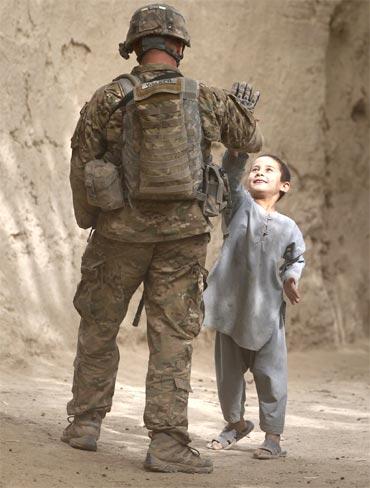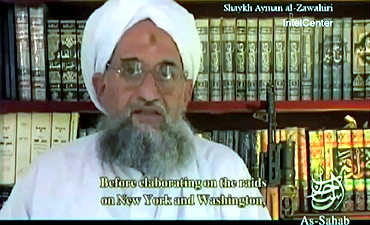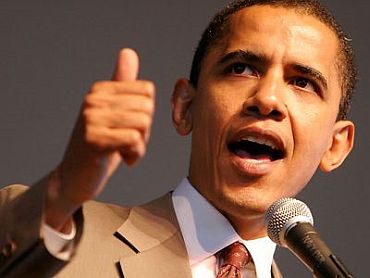 | « Back to article | Print this article |
US troop withdrawal from Afghanistan to start next month
The answer to how the United States will deal with the complex ground situation in Pakistan's jihadi belt has to come from the confused political and military leadership of Pakistan which continues to live in a make-believe world, says security expert B Raman
Pakistan's post-Abbottabad sulking and partly-real, partly-manufactured anti-US anger has had no impact on United States President Barack Obama's counter-sanctuary emphasis in his counter-terrorism strategy.
It was this counter-sanctuary emphasis that enabled the successful extermination of Osama bin Laden on May 2, by US naval commandos at Abbottabad. It has also enabled the successes scored by the drone (pilotless planes of the Central Investigation Agency) strikes against other medium and high-value targets of the Al Qaeda and its affiliates in Pakistan's jihadi belt -- in the tribal areas or outside.
The counter-sanctuary operations that were confined to the tribal belt till May 2, have been extended beyond unilaterally. A future repeat of this extension to areas outside the Federally-Administered Tribal Areas cannot be ruled out if necessary to wipe out the surviving high-value leadership of the Al Qaeda.
This message had repeatedly come out of Washington DC since May 2 and it came out again in Obama's address to the American people on June 23 in which he otlined his plan for a de-surge in Afghanistan, which would involve the withdrawal of troops in two instalments -- 10,000 and 23,000 -- that were sent as reinforcements to Afghanistan in 2009.
The de-surge would start next month and would be completed by election time next year.
Click NEXT to read further...
Afghan Taliban not yet defeated, but contained
The planned de-surge is based on a less pessimistic assessment of the counter-insurgency situation on the ground in Afghanistan. The peak in pessimism seen in 2009 has given way to signs of hope -- though not optimism -- that the war against the Taliban and Al Qaeda has started moving gradually in the direction desired by the US.
In Afghanistan, the Taliban has not yet been defeated, but has been contained. It has been made amenable to enter the process of negotiation. The Al Qaeda, its ally, has suffered such serious attrition in Pakistan that its usefulness as an ally has diminished. The Al Qaeda and its affiliates do not seem to be in a position to reverse the tide and recover their balance.
The threats from the Afghan Taliban and Al Qaeda & Co have been contained. From a phase of containment, the US policy has moved into a phase of elimination of the threat, which does not require the engagement of the same level of forces as until now.
Obama's less pessimistic assessment of the counter-insurgency ground situation in Afghanistan is accompanied by a realistic assessment of the counter-terrorism ground situation in the jihadi belt of Pakistan. The belt remains. The irrational jihadi ardour remains. The insincerity of the Pakistani political and military establishment in dealing with jihadi terrorism remains. The sanctuaries remain. The suspicions regarding Pakistani official complicity with the terrorist remnants remain.
How to deal with this complex ground situation in Pakistan's jihadi belt? Victory is not yet in sight in the counter-insurgency and counter-terrorism operations, but there are hopes of victory. The scene on the ground is no longer one of unmitigated gloom as it was since the 9/11 terrorist strikes in the US homeland.
Click NEXT to read further...
Obama's strong message to Pakistan
How to translate these seeming hopes into durable reality? Will they concretise into reality or turn out to be another chimera? The answer to this question has to come from the jihadi belt of Pakistan. It has to come from the general headquarters of the Pakistan Army. It has to come from the headquarters of the Inter-Services Intelligence.
It has to come from the confused political and military leadership of Pakistan, which continues to live in a make-believe world of its own imaginary creation thinking and hoping that the importance of Pakistan's strategic location and value will once again prevail in the US geostrategic calculations and that it can reverse its tide of gloom.
Obama has taken care to discourage the illusions of the Pakistani leadership. He said in his address to his people: 'Of course, our efforts must also address terrorist safe-havens in Pakistan. No country is more endangered by the presence of violent extremists, which is why we will continue to press Pakistan to expand its participation in securing a more peaceful future for this war-torn region.
'We will work with the Pakistani government to root out the cancer of violent extremism, and we will insist that it keep its commitments. For there should be no doubt that so long as I am President, the United States will never tolerate a safe-haven for those who aim to kill us: they cannot elude us, nor escape the justice they deserve.'
It is a strong message that India has every reason to welcome. There is more stick than carrot in the message. There are more admonitions than lollipops in the message. India should keep discreetly nudging the US to keep translating the message into reality without relenting periodically as the US has been wont to do. That will be in the interest of both the US and India.
Can Pakistan change? Can Pakistan be made to change? The answers to those questions lie in New Delhi and Washington, DC, and nowhere else in the world.


